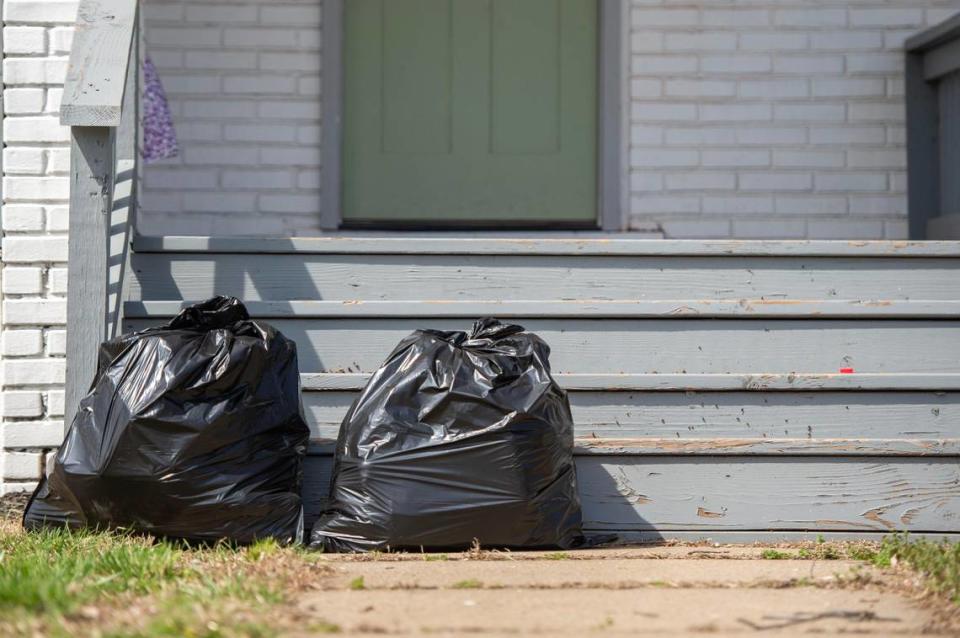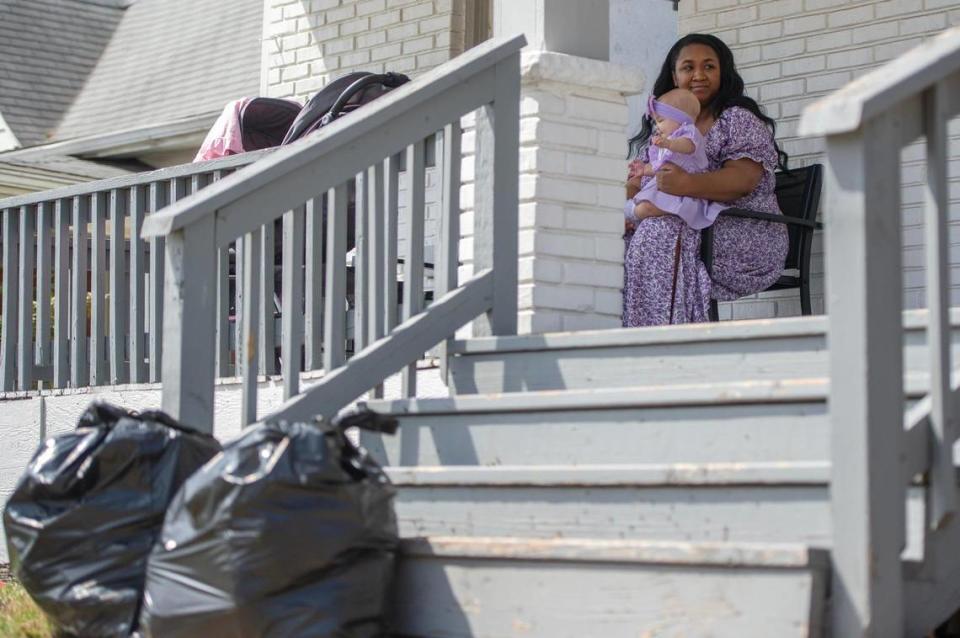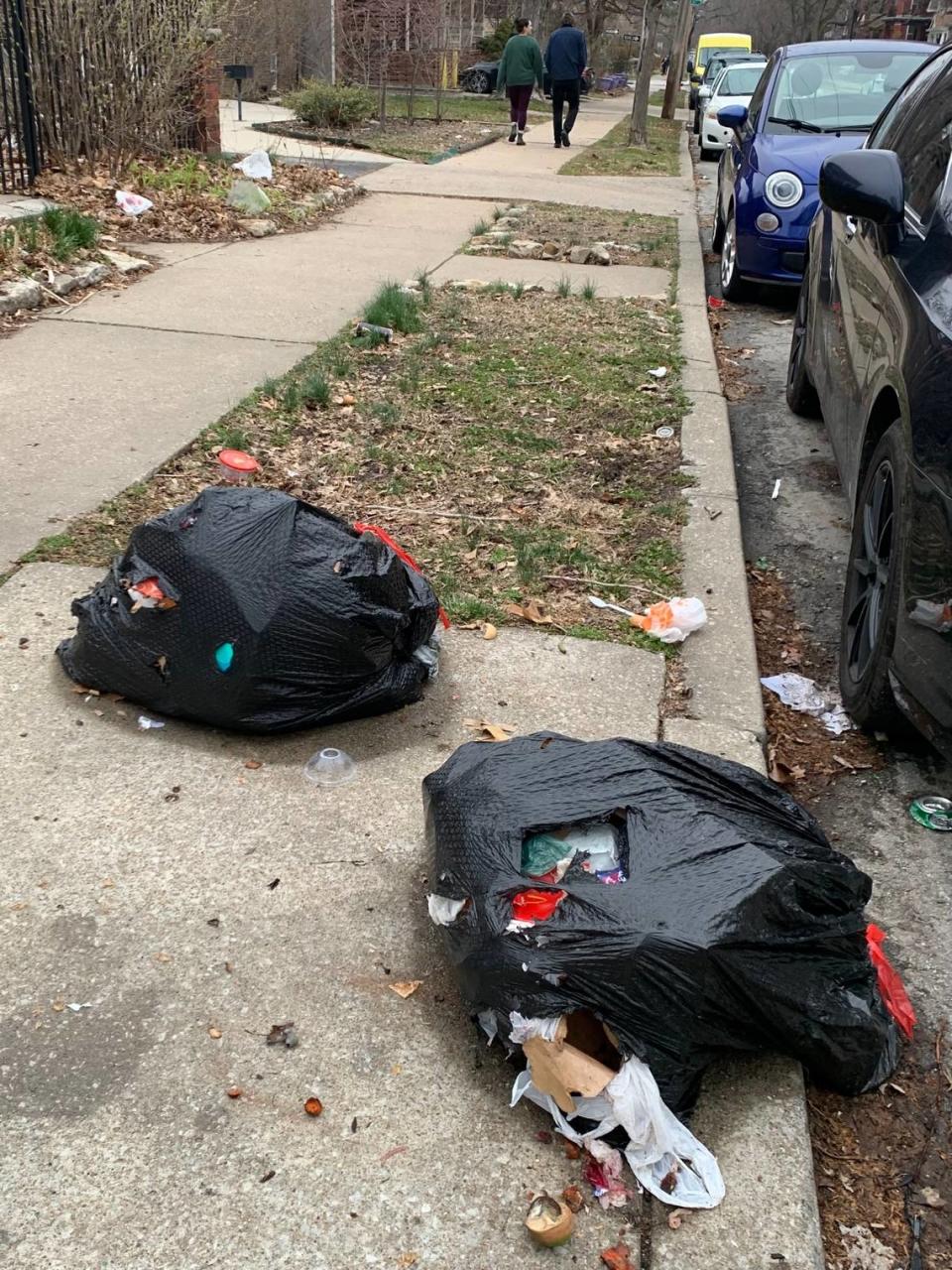Why can you have only 2 bags of trash in Kansas City? History of ‘pay-as-you-throw’ rule
Editor’s note: This story is part of The Star’s series “Talking Trash.” All of the stories were inspired by questions and concerns we heard from Kansas Citians through listening sessions, an online callout and other conversations in our community. Stories will run throughout April, and you can find them all at kansascity.com/topics/kc-trash. You can share thoughts in the form at the bottom of this story, or email kcq@kcstar.com. We’d love for you to join Star staff at a community cleanup event this month (more on that further down).
Taylynne Ivie’s family has been storing extra trash in her house for weeks.
After her son’s birthday party in March, Ivie’s family bagged up at least five bags of trash. Due to the city’s two-bag trash limit, she said her family has been intentional about only putting two bags on the curb each week in front of their home near Lykin’s Square Park in the Historic Northeast.
Ivie said it’s been difficult to find the time to stop by the nearby Westlake ACE Hardware store to buy $2.50 tags for the additional three bags.
So instead of getting rid of all of her trash at once, she has kept extra bags of trash in her house for the past three weeks, patiently putting out two bags on the curb until all of her trash is picked up by the city’s collectors.
Ivie is not alone — residents across the metro have reached out to The Star to share their challenges with the city’s two-bag trash limit.
Some say that its a barrier, making it harder for large or multi-generational families to responsibly dispose of their trash. Others take it one step further and say that it incentivizes illegal dumping, especially for households with incomes that are already stretched thin.
What is Kansas City’s two-bag rule?
The two-bag trash rule is simple.
Households that get city trash service can put out two trash bags that each weigh up to 40 pounds, each week. The bags cannot be in a cart or bin — unless your neighborhood is one of the ones with a trash cart pilot program — they need to be on the curb.
If someone needs to throw away additional trash, they need to go to an ACE Hardware or Price Chopper to buy a trash tag for $2.50 for each additional bag.
If bags don’t have the proper tag, they risk being left behind by city sanitation workers and then sitting outside on the curb for another week until the next collection day.

Where did this two-bag rule come from?
Before there was a two-bag trash limit, there was unlimited trash collection in Kansas City.
That started in 1971 when the city first launched its free municipal trash service, following through on a campaign promise the mayor at the time made when he pushed to increase the city’s earnings tax to 1% (where it remains today).
“Prior to 2004…Kansas City generated about 150,000 tons of trash on an annual basis,” Kansas City Public Works Director Michael Shaw told The Star. “That is like filling Arrowhead Stadium like a bowl of cereal in three years.”
In 2004, the city implemented its two-bag limit at the same time that it introduced its curbside recycling program. The program offered households unlimited recycling pickup. Residents could purchase open top recycling bins from retail stores or put their recyclables in a cardboard box or other labeled container.
Read more about Kansas City’s new plan to introduce recycling carts.
The hope was that people would recycle more and throw away less trash, according to Shaw, who oversaw the city’s solid waste division at the time.
“The original ordinance called for (it to be) limited to one bag of trash,” said Former City Councilmember Deb Hermann, who served on the Kansas City Council in 2004. “Myself along with others thought that wasn’t reasonable, so we increased it to two.”
If someone had additional trash beyond their two-bag allotment, they would need to pick up a trash tag from a local store.
“We implemented what’s called a ‘pay as you throw’ program,” Shaw said. “So it was the idea that you get two bags of trash and every bag thereafter, back then it [would] cost $1 a bag.”
Although the cost of trash tags for additional trash started at $1, the price to ‘pay as you throw’ eventually increased. In 2010, the price of the trash tags doubled to $2, and then the tags went up to $2.50 in 2014.
Pay-what-you-throw programs — when cities charge residents for trash based on the amount they throw away — were popular at the time Kansas City created the two-bag limit and touted by the Environmental Protection Agency. Most programs came alongside free recycling or composting services, and many came with discounts for lower income households.
Researchers have studied, and cities all over the country still use versions of the model. Denver just passed a pay-what-you-throw ordinance last year.
Has the two-bag rule reduced the trash Kansas City sends to landfills?
The short answer is: It did at first, but not really anymore.
Hermann, who currently serves as the CEO of the Northland Neighborhoods Inc., said she is surprised that the two-bag limit hasn’t done more to lessen the amount of solid waste collected in the city.
The rule did have a major effect when it was first implemented.
Kansas City data shows that the amount of trash collected declined steadily between 2004 and 2016 after the two-bag limit and unlimited recycling program were put in place.
Shaw said the city went from collecting 150,000 tons of trash to about 75,000 tons on an annual basis.
But that amount began to increase gradually in the last several years. After the pandemic, Shaw said the city actually began collecting upwards of 115,000 tons a year. He attributes the increase to more residents working from home and a larger population.
Read more about where Kansas City’s trash goes.
The population of Kansas City has grown since the rule was first introduced. In 2004 the population was just over 440,000. It has since grown to more than 500,000, according to 2021 census data.
Since 2020, the amount of trash produced in Kansas City has gone up, while recycling has gone down, Shaw said.
“We’re picking up more trash,” Shaw told The Star. “People are generating more waste.”
In 2021, he tweeted that “KCMO trash tonnages are up over 25% and climbing.”
Read more about how recycling really works in Kansas City.
When Kansas City implemented curbside recycling, it had a goal to divert 80% of the city’s trash from landfills. The city has fallen way short of that goal, and Shaw said it’s “because there are several aggressive steps that needed to happen along the way that didn’t happen.”
He said the recession in 2008 stalled the city’s progress quite a bit, as well as some limitations from the state of Missouri.
“Now we’re able to come back and start to revisit some of those conversations,” he said.

The challenges with only two bags
Ivie said that she feels like the two-bag limit is unreasonable.
“I’ve never met one household that likes the two-bag limit,” she told The Star.
Ivie said that she does her best to purchase the tags or hold onto her trash when she has more than two bags on trash day. Despite her efforts, she said getting the extra tags is a hassle.
South of Ivie in the Ivanhoe neighborhood, other residents told The Star that they think the two-bag limit is a strain for families with lower incomes, and that it could also be a driving factor for illegal dumping in Kansas City neighborhoods.
“In an area of town where the median income is under $30,000, to charge people for more than two bags, to me, is not a workable solution,” said Alan Young, a leader of the Ivanhoe Neighborhood Council and co-founder of Young Family Farm. “Needing to pay for trash bags is a barrier.”
Young helps maintain hundreds of lots in Ivanhoe that the neighborhood council owns, and he said he regularly finds extra bags of household trash left out on those lots.
Ivie said she’s also watched many of her neighbors turn to a nearby empty lot to illegally dump their excess garbage instead of buying bag tags.
“The root of the problem in my opinion is the two-bag limit, and the one day a week pickup,” Young said of the trash he finds dumped on the lots. “Two bags of trash for most families is not enough.”
‘Trash is everywhere’
For some residents, the two bag system is less about the amount of trash, but really about how messy it can get.
Young and several other readers who wrote in to The Star described a familiar situation they witness: When families leave out more than two bags without tags, collectors will leave the rest behind on trash day.
“The dogs tear it up, the wind blows it all over the neighborhood,” Young said.
Read more about Kansas City’s most common recycling mistakes.
“Trash is everywhere,” Ivie said.
Reader Molly Noren said she doesn’t really mind the two bag limit, but she wishes she could put the bags in a bin or cart.
“I’ve seen the bags leak and I’ve seen them torn open by dogs and other animals,” Noren said in an email.
“It’s pretty gross,” reader and Hyde Park resident Hillary Howell told The Star. “You kind of have to keep your trash in until the morning of your pickup because otherwise animals will get into your trash and spread it around.”

When will the city get trash cans?
The city is in the beginning stages of getting trash carts for residents, according to City Manager Brian Platt. There is $1 million set aside for trash carts in the city’s Public Works budget for this next fiscal year starting in May.
However, the city has not announced a plan for how that money will be spent or when residents will see those trash carts.
Last year, the city council proposed $17 million for both recycling carts and trash carts. It was later reduced to $5.4 million for just recycling carts, which will roll out next month.
Kansas City officials also had plans to get trash carts as far back as 2005. The proposal then called for 65-gallon carts with lids and for trucks with a hydraulic arm to empty the carts. The Star had reported back then that current Public Works director Shaw supported the idea.
Opponents at the time felt that the containers wouldn’t make Kansas City any cleaner if citizens continued to dump trash in streets or vacant lots. They also said they worried about theft and vandalism of containers.
Now that the city’s recycling carts will soon be distributed, trash carts may be on the horizon for residents as well.
“We did say we would put trash carts on the budget after we did recycling,” 1st District Councilwoman Heather Hall said during the budget hearing. “I hope someone would champion finishing that because I’d like to see it happen.”
Until then, residents will still be expected to follow the city’s two-bag trash limit. To find your trash day, visit here.
Here’s where you can buy an extra trash tag in Kansas City
Westlake Ace Hardware Stores
5009 N.E. Vivion Road
6201 Independence Ave.
1000 Westport Road
104 W. 63rd St.
103 S. 291 Hwy, Lee’s Summit
444 S.W. Ward Road, Lee’s Summit
1020 W. 103rd St.10130 E. 350 Hwy, Raytown
5945 Antioch Road, Gladstone
Price Chopper Stores
9717 N. Ash Avenue
896 S. Hwy 291, Liberty
500 N.E. Barry Road
9107 N.W. Hwy 45, Parkville
4820 N. Oak Trafficway
5800 Wilson Road
6327 Brookside Blvd.
8700 E. 63rd St.
8430 Wornall Road
5665 E. Bannister Road
1030 W. 103rd St.
4201 S. Noland Road, Independence
12220 US 71 Hwy, Grandview
Cortlynn Stark’s and Lynn Horsley’s past reporting contributed to this report.

